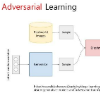Modern machine learning (ML) models are becoming increasingly popular and are widely used in decision-making systems. However, studies have shown critical issues of ML discrimination and unfairness, which hinder their adoption on high-stake applications. Recent research on fair classifiers has drawn significant attention to develop effective algorithms to achieve fairness and good classification performance. Despite the great success of these fairness-aware machine learning models, most of the existing models require sensitive attributes to preprocess the data, regularize the model learning or postprocess the prediction to have fair predictions. However, sensitive attributes are often incomplete or even unavailable due to privacy, legal or regulation restrictions. Though we lack the sensitive attribute for training a fair model in the target domain, there might exist a similar domain that has sensitive attributes. Thus, it is important to exploit auxiliary information from the similar domain to help improve fair classification in the target domain. Therefore, in this paper, we study a novel problem of exploring domain adaptation for fair classification. We propose a new framework that can simultaneously estimate the sensitive attributes while learning a fair classifier in the target domain. Extensive experiments on real-world datasets illustrate the effectiveness of the proposed model for fair classification, even when no sensitive attributes are available in the target domain.
翻译:现代机器学习(ML)模式越来越受欢迎,并被广泛用于决策系统;然而,研究显示ML歧视和不公平的关键问题,这些问题妨碍在高占用应用领域采用这种模式;最近关于公平分类的研究已引起对制定有效算法的极大注意,以实现公平和良好的分类业绩;尽管这些公平认知的机器学习模式取得了巨大成功,但大多数现有模式都要求数据预处理具有敏感属性,使模型学习或后处理过程的预测正规化,以便有公平的预测;然而,由于隐私、法律或规章限制,敏感属性往往不完整,甚至得不到。虽然我们缺乏在目标领域培训公平模型的敏感属性,但可能存在类似的领域,具有敏感的属性。因此,必须利用类似领域的辅助信息来帮助改进目标领域的公平分类工作。因此,在本文件中,我们研究了探索公平分类领域适应的新问题。我们提出了一个新的框架,可以同时估计敏感属性,同时学习目标领域的公平分类。在现实世界数据集方面进行的广泛实验,说明拟议的公平分类模型的有效性,即使没有敏感的域。




